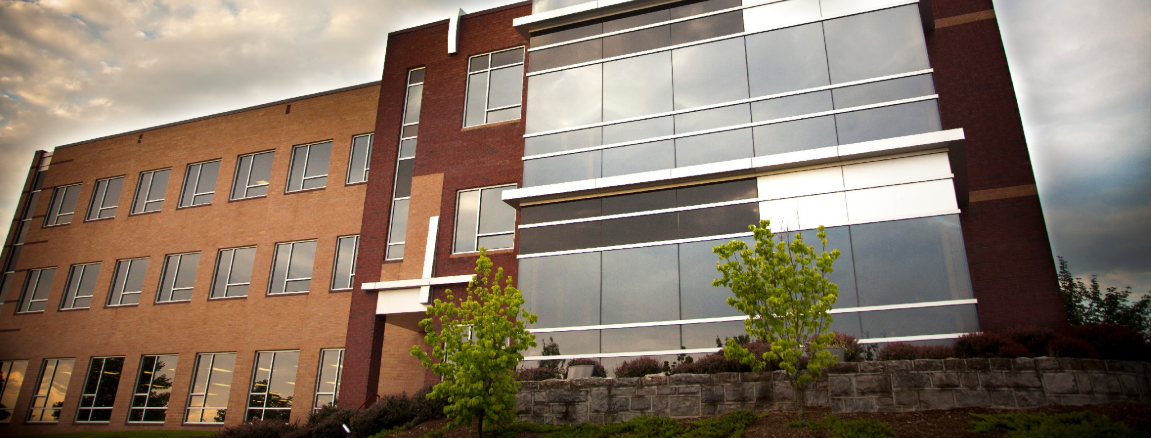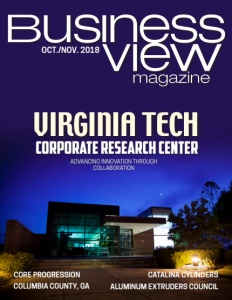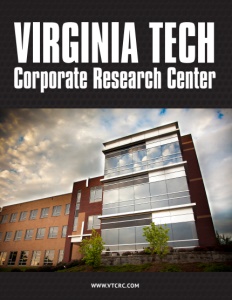Virginia Tech Corporate Research Center
Advancing innovation through collaboration
Business View Magazine interview representatives of the Virginia Tech Corporate Research Center for our focus on Innovation in Higher Education in America.
Established in 1985 in Blacksburg, Virginia, the 230-acre Virginia Tech Corporate Research Center (VTCRC) boasts more than 33 buildings with over 3,000 employees and is home to more than 180 research, technology, and support companies. VTCRC is a for-profit, wholly-owned, private subsidiary of the Virginia Tech Foundation, which strives to develop a growing, prestigious research park for high technology companies and, in collaboration with the university, advance the research, educational, and technology transfer missions of Virginia Tech.
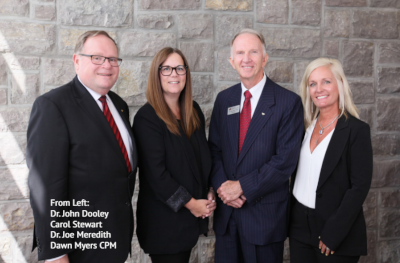
Business View Magazine recently delved into the visionary operations and goals of the Virginia Tech Corporate Research Center with an interview panel featuring: Dr. Joe Meredith, President & CEO of VTCRC; Dr. John Dooley, CEO Virginia Tech Foundation; Dawn Myers, COO of VTCRC; and Carol Stewart, CEO of Association of University Research Parks (AURP). The following is an edited transcript of that interview.
BVM: Let’s begin with an overview of the Virginia Tech Corporate Research Center. How/when did it get started, and what was the objective with the build?
Dr. Meredith: In the early 1980s, the State of Virginia came to Virginia Tech and asked what kind of programs we had to help manufacturing and service businesses in the state. They acknowledged that we had done a fantastic land grant job with agriculture, but they were concerned about the emerging new economy in manufacturing. The university formed a committee to study that issue and recommended the formation of two companies: Virginia Tech Intellectual Properties, to manage all the intellectual property coming from university research; and a Corporate Research Center to build relationships between research from companies in the Research Park to the university, and opportunities for students and faculty to support companies in the private sector. Around 1988, the first couple of buildings were constructed and we never looked back.”
Dr. Dooley: “The Foundation took the lead with the development of the Corporate Research Center and we’re very proud to be associated with them over this period of time. I believe the original vision was for the VTCRC to be a real estate enterprise, but we’ve discovered that the secret sauce was for it to be a business/technology services endeavor. Dr. Meredith and his staff do an excellent job of bringing in added value in business programs and development to the tenants that are here. That is the key characteristic of this enterprise.”
BVM: Can you take us through the current operations of the Virginia Tech Corporate Research Center?
Dr. Meredith: “We go out and recruit companies, we create companies, and we try to leverage companies that already have a relationship with Virginia Tech. A third of the companies in the research park are local entrepreneurs that conclude they can do something better, cheaper, and/or faster than somebody else. About one fifth are larger companies that are opening branch offices here to take advantage of research opportunities or access to talent coming from the university. We have coaches on staff to help early stage companies understand things such as equity, raising money, and business development, so they’ll be more successful.”
Dr. Dooley: “We’re enablers. We want to find ways to connect with emerging technologies and discoveries coming out of the university, and through other entrepreneurs, and help develop them. We like to position ourselves as value-added to provide connections and pathways for companies to be successful. It’s not just a national presence, there are also international companies that chose to locate in the Park, recognizing the access to talent and technical skill the university brings.”
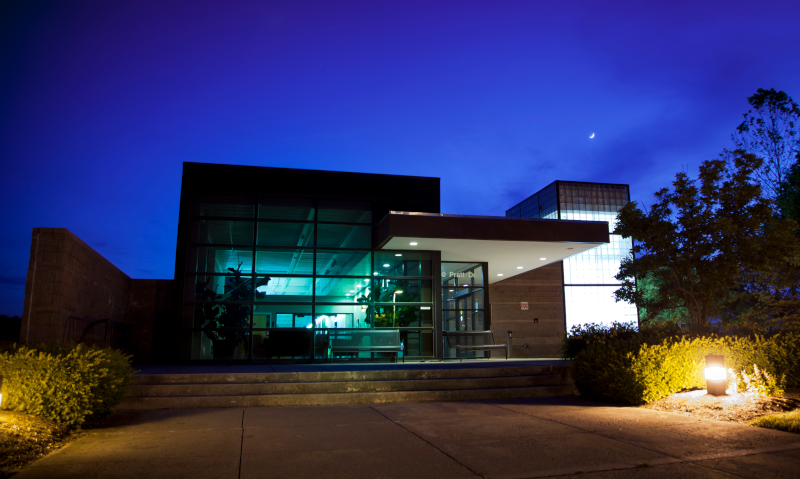
BVM: What technological advancements did the Virginia Tech Corporate Research Center build into the infrastructure to assist your clients?
Myers: “In 2015, we upgraded our network to deliver 1 gigabit internet circuits to each office suite. This level of connectivity is one hundred times faster than most organizations are using today. The network offers a built-in system redundancy, so tenants always have Internet, the technology to handle video conferencing, VoIP from any suite, expandability so tenants can get the bandwidth and capability they need without major upgrades to the system, and monitoring so issues can be resolved quickly. We can assist clients of all sizes and their full range of IT needs – from a start-up to a full-scale global company.”
BVM: What is the competitive advantage that Virginia Tech Corporate Research Center offers for their clients?
Dr. Meredith: “We have learned over the years that focusing on diversity of technologies creates the opportunity for collaboration. For example: computer companies that team up with bio-tech companies and then work in the field in between – like bio-informatics. We have intentionally solicited diverse technologies, whereas other research parks around the country have focused on bio-tech or solar or advanced materials. We think having a bit of everything is the best strategy.
“Of the 3,000 plus employees here, about 10 percent are taking at least one class at the university. The interesting thing we’ve learned from our customers is that more than 50 percent of the 3,000 have no degree from Virginia Tech. When we talk about the Research Park being an economic engine, these are all people recruited from elsewhere who have come to Blacksburg to meet job opportunities.”
BVM: With regards to capital investment, what areas are the next notable investments/projects? And how do environmental initiatives come into play?
Dr. Meredith: “The next big project is housing. We’re excited about having the opportunity for our tenants’ employees to live, work, and play in the same integrated community. A private developer is building apartments and condos on land adjacent to the Research Park that will allow people to walk from their residence to their office. For sustainability, that’s a great thing to take pressure off the transportation system, reducing traffic backups on the main roads around here, and saving energy and cutting emissions. We’re fortunate to have more land available near our park than others that are city-based.”
Myers: “Environmental sustainability is an area we are continuously focusing on: currently we offer electric car charging stations, and a recycling program that began in 2014 and since has nearly recycled 200 tons (almost half a million pounds) of material from going into the landfill. By using our compacting equipment to compress our waste/trash, we have reduced the amount of landfill space the VTCRC uses by 500 percent. In addition, we have a light bulb recycling program that has contributed to a truly massive reduction in the VTCRC’s overall carbon footprint over the last four years. Ongoing environmental and energy saving measures include: stormwater management; a bus transit system to reduce car usage/carbon footprint; new building construction that will have the first example of a white, high-reflective roofing membrane for solar reflectance and heat mitigation; and the implementation of LED lighting.
“The research park has many companies that are working to solve energy and environmental impact issues in a variety of ways. For example: developing robotic simulation software for aerospace, automotive, renewable energy, and manufacturing markets; providing consultation, lab services, and water quality monitoring technology to water, waste water, and chemical manufacturing clientele.”
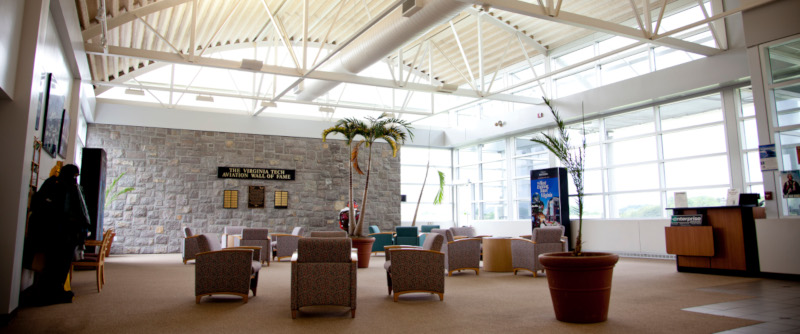
BVM: What does the future hold for Virginia Tech Corporate Research Center? What are your goals and objectives for the next five years?
Dr. Meredith: “We have a 30-year track record of stable growth and I certainly expect to see more of that, but what’s really exciting is the way Virginia Tech has embraced entrepreneurship in the last few years. The university is investing heavily in additional research now, and that research becomes the seed corn for future companies.
“A lot of what we do is broker connections using Virginia Tech’s international relationships between people around the world who have problems, and folks, faculty, and students here in the community that can solve those problems. The most important point, to me, is the opportunities that companies have to partner with research universities to further their business success. If they understand that, they would understand that the Research Park becomes a platform to achieve that objective.”
Stewart: “Although research parks are all very different, there are some fundamental elements that are common. They foster the knowledge flow between universities and industry by providing a collaborative and accelerated environment that supports the journey of ideas born from research, through the commercialization process into products for the market, while creating economic growth from the investment made in education. Research parks are one of the highest concentrations of experiential learning outlets for students in our communities, providing placement and job experiences for thousands of students each year to gain hands-on experience in the classroom and the workforce with today’s most progressive companies – from start-ups to global research-intensive companies.”
Dr. Dooley: “Virginia Tech is very much growing our graduate and undergraduate population. We have a strong emphasis on creating innovation that has impact. And our responsibility as leaders of the Corporate Research Center is making sure we provide the assets, facilities, and services that will accommodate the opportunities that will come from that growth. We’re about seizing and creating opportunities and that’s the philosophy by which we lead the Foundation and the CRC: to create economic well being for the companies and the people who work and play here. We have a major stake in the future economic vitality of this region of the state.”
Check out this handpicked feature on thinkstep – Building more sustainable companies.
AT A GLANCE
WHO: Virginia Tech Corporate Research Center (VTCRC)
WHAT: Non-profit research park for high technology companies
WHERE: Blacksburg, Virginia
WEBSITE: www.vtcrc.com
PREFERRED VENDORS

GJ Hopkins – www.gjhopkins.com
G.J. Hopkins, Inc. (GJH) is a mechanical and electrical contracting business based in Roanoke, Virginia. Since its founding in 1958, GJH has provided reliable, top-quality service. The staff of dedicated, experienced personnel at GJH is committed to the highest standards of integrity, quality and performance; client-focused service has always been one the core values of GJH. They have provided mechanical and plumbing construction services and HVAC service for the Virginia Tech Corporate Research Center for over 25 years.
